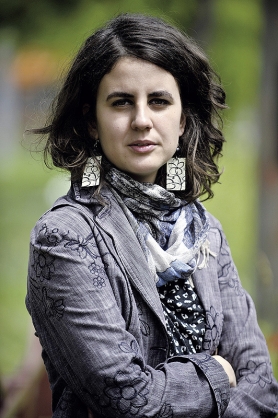Tanja Šljivar
area: Literature
Key Facts
nationality
Bosnia and Herzegovinaarea
Literatureresidence
Gießen (GER)recommending institution
BMEIAtime period
December 2015 - January 2016Tanja Šljivar was born in Banjaluka, SFR Yugoslavia in 1988. She holds both BA and MA degree in dramaturgy at Faculty of drama arts in Belgrade, Serbia. She wrote full length plays How much is Pate?, Scratching or How my grandmother killed herself, We are the ones our parents warned us of and But the city has protected me and short play Stillborn, which were published, publicly read and produced in professional theaters in Bosnia and Herzegovina, Croatia, Serbia, Spain, Poland, Austria and Germany. She also writes short stories, radio plays, screenplays for short films and theater-theory texts. She won several awards for her playwriting in Bosnia and Serbia, and her plays have been translated into some 10 languages. She has been a guest of writing residencie IHAG in Graz, Austria and she is currently attending MA course in applied theater science in Giessen, Germany.
All adventurous women do - synopsis
A year ago, in the Bosnian daily newspaper, a piece of news was published, in which a gynecologist mentioned as an example of bad and uneducated sexual behavior of the teens, the recent case of seven thirteen year old girls that all got pregnant during the school trip. This news escalated into scandal, with an international media such as Deutsche Welle reporting on it. The girls in this case were regarded and blamed as collective, together with their whole families, and boys, still individuals, who obviously also took part in the event, were left out. All adventurous women do is a play about necessity to go elsewhere to fully realize one's own sexuality, of necessity to go elsewhere to be able to decide on one's own body, of necessity to go elsewhere to be able to decide on one's own life. In almost all-female cast, I would like to give a voice to the voiceless girls, from the small Bosnian towns, to invisible, non-represented girls who communicate only among themselves via video blogs, Facebook, Skype and Instagram. Seven girls, are eating sweets, drinking coffee and alcohol, smoking, eating meat, and talking about how bored they are in their small town and how willing and prepared to have sex they are. The school trip with having sex, together with the descriptions of the city they are visiting and basement night clubs they are going to and socijalist modernism hotels they are staying at, as well as finding out about pregnancies and trying to talk to their parents and boys about it, and finally getting abortions, with discriminatory and harsh medical workers, in dirty hospitals, will be mostly narrated through the intersceting monologues of the girls, in which the unreliability of their memories on the whole will be obvious. The chauvinist, violent, by internet pornography severely influenced sexual behavior of the young boys will also be thematized.
On a similar case of collective teenage pregnancies in Massachusetts Nina Power writes: It is easier to imagine the end of the world than it is to imagine the death of the nuclear family. With this play I want to imagine, investigate and reimagine what happens when a group of teenage girls decide to rewrite patriarchy's concepts of family, to have sex, get pregnant, get abortions and get severely punished from the society for doing it all and yet not the least caring about the punishment and exclusion from the society to to which they never really belonged.
To write a report on this residency is to write a report on something I might as well denote as “the time of my life”, or better “one of the times of my life”. Capitalist factories are glittering unlike the remnants of the socialist factories - and this is my first impression of Vienna. Actually, as a 13 year old girl my first trip ever to some foreign country was to Vienna, and my first impression of the city was “Lepa Brena” bar. Back then I saw Breugel, I saw Nationalbibliothek, Schönbrunn and Staatsoper and I really thought I am in heaven. Later on, I’ve been able to trace the sources of this heaven partly also in its past in imperialism and its present in capitalism. Back then, when I was as old as the girls from the play I wrote during my residential stay in Vienna, when I was 13 – which is the most beautiful number as one of the girls states in the play, a male tourist guide described to us the Mariahilferstraße as the street through which women need twice as much time as men do to pass through. I wonder if he is still repeating that chauvinist joke on women and shopping during his Viennese tours even in 2016. Now, in 2016, in Vienna, I was provided with a huge working space, and with a huge white working desk in it - perfect to fetishize both my position as the female writer-in residency and the beautiful piece of furniture itself– and all that with a window view to the very Mariahilferstraße. I did buy one coat in one of numerous shops on this street, but usually I was walking pretty fast down it, faster than many men did, for sure. On the first morning of February, when I had my flight back to Germany, I was passing by the capitalist factories again. Even they are not that glittery in the morning, even the capital has to have its rest.
